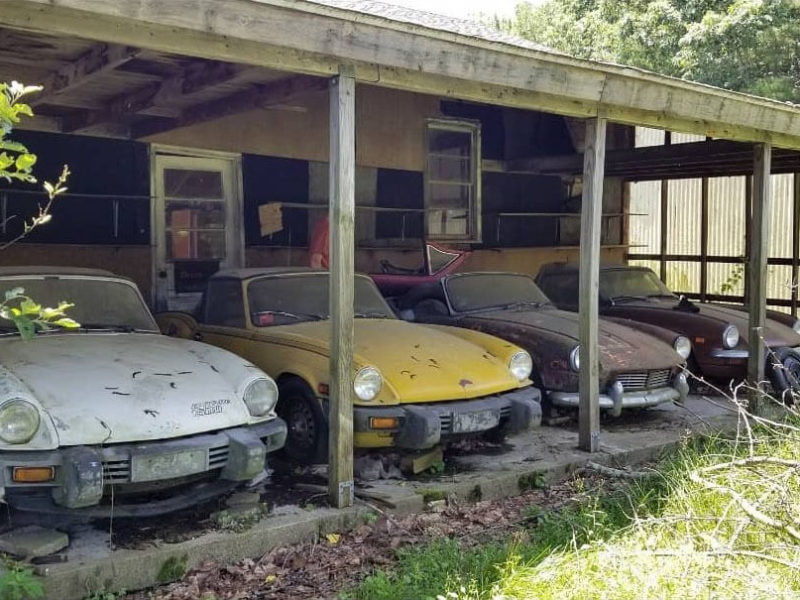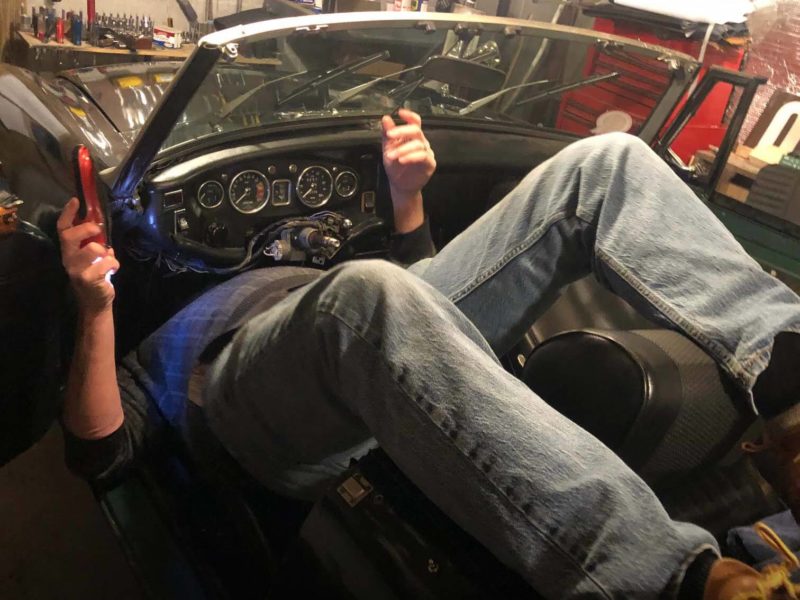Clutch problems fall into three categories:
a) The clutch does not release properly when the pedal is depressed, resulting in difficult engaging of gears.
b) Clutch slip, a condition where the engine speed increases when you give the car gas while in gear, but the car does not speed up accordingly.
c) Clutch judder, where the car does not take up smoothly as you let the clutch out.
Problem “a” is usually caused by faulty hydraulics. First, check that there is sufficient fluid in the clutch master cylinder. If the level is low, look for leaks at the master cylinder or slave cylinder, and rebuild or replace these cylinders as necessary. If the level is okay and there are no leaks evident, bleed the system to ensure there is no air present. Check that the flexible hose has not deteriorated; watch to see that it does not expand in diameter while a colleague pushes the clutch pedal. If the hydraulics are working properly, the end of the throwout fork arm should travel 3/8”. If the clutch does not release properly, even though the hydraulics are working correctly, either the throwout bearing is completely worn out (so the pressure plate is not being pushed far enough to release the disc), or the disc itself is hanging up. Either of these problems require that the engine be removed to inspect and remedy the situation.
Problems “b” and “c” both require that the engine be removed to get at the clutch. Clutch slip results from the disc being worn out or oily, (which also causes judder,) or the pressure plate springs being weak. Since getting to the clutch is such a labor intensive operation, we strongly recommend replacing the disc, pressure plate and throwout bearing if you have a mechanical problem with your clutch. Excess play of the lever will cause premature wear on the throwout bearing. A new throwout bearing has 11/64” of carbon thrust face exposed from the metal body; if yours has 1/8” or less, it should be replaced, too. If your disc has worn so far that the rivets are exposed, check the face of the flywheel for grooves, it must be removed and resurfaced if the surface is scored noticeably.
Special Note: While doing a clutch job, always check the ring gear for damage to the teeth, and install a new one if significant damage is present.







'Diagnosing Clutch Problems' have 12 comments
May 9, 2012 @ 7:20 am AJ
Hi, I recently as in yesterday 5/8/12 completed a 3 yr.restoration on my 61 MGA ! Everything went pretty good except when i go to move the vech and let the clutch out a get a noise that sounds like a bad throw out bearing.. i replaced every part on this vech inc. all drive line parts. I am not a very experienced mechanic that’s why the resto took 3 yrs.haha. The clutch works fine except for the noise.
My questions is should i drive it to see if the new items settle in or am i dreaming that could happen..?
Any reply’s or ideas will be very appreciated.
September 10, 2015 @ 11:16 am Richard Booton & Sue Worthy
Hello AJ.
My name is Richard from the UK (I don’t know your location) and I was “wandering around” on the internet trying to get a handle on a frustrating problem with my MGA. I have found your post from back in 2012 with read it with great interest as it describes my issue exactly.
You wrote about your new clutch and that when you let the clutch out you get a noise like a bad throw out bearing, this is precisely the issue I’ve been trying (and failing) to solve for a couple of months now. Obviously I’ve replaced the complete clutch (twice) including the throw out bearing.
My grinding noise in intermittent, but it means I don’t drive anywhere with any confidence, if you see what I mean
I was wondering if you have a moment if you would let me know what happened back in 2012, did you solve the problem..? If so I’d love some info as to how you did it, it would be genuinely appreciated as it’s driving me crazy…
Thanks very much.
Best wishes
Richard Booton (and Sue Worthy my wife who actually owns the car)
June 26, 2012 @ 7:05 am John
Warped flywheel?
June 26, 2012 @ 9:41 am rick
Clutch slip can also be caused by the release bearing sticking on the input shaft. Sometimes manifests itself after a rebuild, that’s when mine showed up
June 18, 2023 @ 7:51 pm WILLIAM WETZEL
The clutch does not engage until the clutch pedal is almost all the way out. No slipping after clutch engagement.
July 2, 2012 @ 11:02 am Kevin M Guilmet
I am looking for tech tips to put in a overdrive on a four speed trannie, on a 1974 Spitfire. Have new clutch kit to put in and I have a type D overdrive unit. Will give it my best shot but could use all the help I can get.
Thanks Seattle Kevin
January 12, 2013 @ 10:33 am Denis
I installed a new flywheel and ceramic clutch kit, release bearing etc. As soon as I got the truck off the hoist to try it, the truck was jerking like hell. Someone told me a ceramic clutch is ten times better than a regular clutch. Well I do not know, but I never had that problem with a regular clutch. What could be the problem? Your help will be appreciated, thank you.
September 10, 2015 @ 11:16 pm Richard & Sue
Hello
Richard & Sue from the UK here with a frustrating clutch issue on my MGA, I’d love to know if anyone out there has had similar experiences and how they fixed them..?
I recently replaced the worn clutch with a complete new kit from the owners club and whilst the new clutch works perfectly just occasionally when manoeuvring the car at slow speed I dip the clutch and get a fast whirring or grinding sound, a little like an industrial version of an electric drill. The sound comes in instantly and after a second or so cuts out, and everything points to a problem with the clutch release (throw out) bearing..?
However we have replaced that twice and treble checked just about everything else, and it’s driving me crazy.
Sue and I use the car for European holidays, and parade laps at some of the bigger Classic Car festivals, but now after 5 faultless years of ownership I cannot drive it anywhere with any confidence, and certainly not a long distance holiday.
Any thoughts, however “off the wall” would be great as I’m really stuck for answers…
Cheers
Richard and Sue (She actually owns the car)
May 1, 2019 @ 10:35 am James Patrick
73 MG Midget experiences an intermittent clutch disengagement problem. The clutch won’t fully disengage at times. Because of clutch problem, car sat unused for years then we started it and the clutch operated fine for six months. Then the intermittent clutch disengagement problem returned. We have replaced the master and slave along with the hose. System was bled at lease eight times. Please note that the clutch never slipped and always worked properly aside from this problem. The problem comes and goes. Now the problem wants to remain. Thank you.
June 17, 2020 @ 8:50 pm Steve Livesley
There is a definite trick to bleeding the clutch on the mgb and most likely some on mga and midgets. I put some pictures and the method i used on my blog at https://mgb.tips/2020/05/21/mgb-clutch-slave-cylinder-replacement/
Hope this helps
May 5, 2019 @ 2:51 am Patrick Finnerty
Hi .Ihave just bought a 1977 mg midget 1500 , the problem i have is only sometimes when i start it up i cant i cant get any gears. So i turn off ignition it will then engage in gear . again sometimes it moves before i release the clutch, but ones i drive it there is no problem getting the gears. the car did sit for 7 years and i have only done around 150 miles. since buying it.
Do i need a new clutch fitting i am great at cleaning cars but i no nothing about engines.
Patrick
June 18, 2023 @ 8:03 pm WILLIAM WETZEL
I am trying to troubleshoot my 1979 MGB. The clutch does not engage until the clutch pedal is almost all the way out. No slipping after clutch engagement.